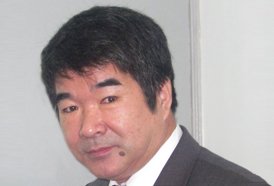Mr Imamichi: We are aiming at 15-20 percent growth over the next year
December 14, 2012 | Friday | Interviews | By BioSpectrum Bureau
Mr Imamichi: We are aiming at 15-20 percent growth over the next year
Mr Senya Imamichi, managing director, Shimadzu Analytical India
With a view of expanding its customer base, Shimadzu Analytical India has been taking concrete steps towards connecting with its customers through various initiatives. Recently, it organized "Food Safety" seminars in five different cities-namely, Bangalore, Hyderabad, Kochi, Mumbai, and New Delhi-to educate researchers about its existing technologies in the food safety space.
In a conversation with BioSpectrum, Mr Imamichi, MD, Shimadzu Analytical India speaks about his plans to focus on the food safety vertical and also about the growth of the life sciences industry.
What do you think that differentiates Shimadzu from its competitors?
In our perspective, Shimadzu is a complete solutions provider. Take the example of food; there are various contaminants present in the food that require different types of analysis. Shimadzu is uniquely placed in this regard, as it caters to identifying and analyzing all types of impurities. We have specific packages designed for low-level quantification of all types of inorganic impurities as well as matrix-assisted laser desorption/ionization (MALDI)-based solution for biological contaminants. Hence, Shimadzu is a good option for labs looking to tackle all of these issues.
Shimadzu India also has the capability of supplying application packages along with the necessary equipment, allowing the user to adopt according to their needs. Also, they are ably supported by our application scientists. All these steps come under our food safety total solutions initiatives. Such measures offer more value for the customer, as compared to just getting equipment from any vendor.
We observe that, the challenge today is to provide the right support team for running the systems. We, at Shimadzu, also conduct over 100 training courses every year, to train the technicians who use the instruments, which shows our commitment to further encourage growth in this field. There are also plans for the expansion of this support centre as well.
What have been the recent launches in the life sciences segment?
We have expanded our mass spectrometry (MS) portfolio recently with the addition of LCMS-8040, LCMS -8080 and a triple quadrapole GCMS TQ8030, as well as Shimadzu's own chromatography data management system.
To be frank, in the triple quad MS segment, was a late entrant into the Indian market. However, the market is expanding, especially in India where the rate of expansion is much faster than in other countries. So, even though we have entered a bit late, we see the acceptance for the ultra fast mass spectrometry (UFMS) technology among customers.
What do you think is the strength of Shimadzu?
Shimadzu is very strong in LCMS, GCMS, single quad GCMS, chromatography, single quad LCMS, and spectrophotometers. We have the largest market share in chromatography and spectrophotometers, but we would like to expand it further.
We have a market share of 35 percent in chromatography segment, with Shimadzu crossing 14,000 high performance liquid chromatography (HPLC) system installations to date in India. The single Quad MS market has very few players, so our share would be around 35-40 percent.
Shimadzu has had a very strong and unique relationship with its distributors. Can you elaborate about it?
In the analytical landscape, the Shimadzu family consists of Shimadzu India, plus our marketing partners Spinco, Saksham, Swan, and Toshvin. This makes it one of the largest combined forces for Shimadzu products in India. We have adopted this model of partnering with our distributors, so as to leverage their market reach and experience.
What are the trends you see in the market and what are your future plans for growth?
The trend we have analyzed so far is that, people are now looking for more high-end instruments such as MS as compared to the chromatography systems before.
The depreciating rupee has affected our operations, however as the generics and biosimilars industry grows, we anticipate a corresponding increase in the need for sophisticated instruments thereby fueling further growth. Most of the developed countries have already established their use of this technology. So its emerging markets such as India that hold a lot of promise and have a lot of demand as well.
We are aiming at 15-20 percent growth in the coming years, building on our expanded MS portfolio as well as our other initiatives. Additionally, we are in the midst of planning mini seminars on different issues and other activities to penetrate more deeply into our target base.









